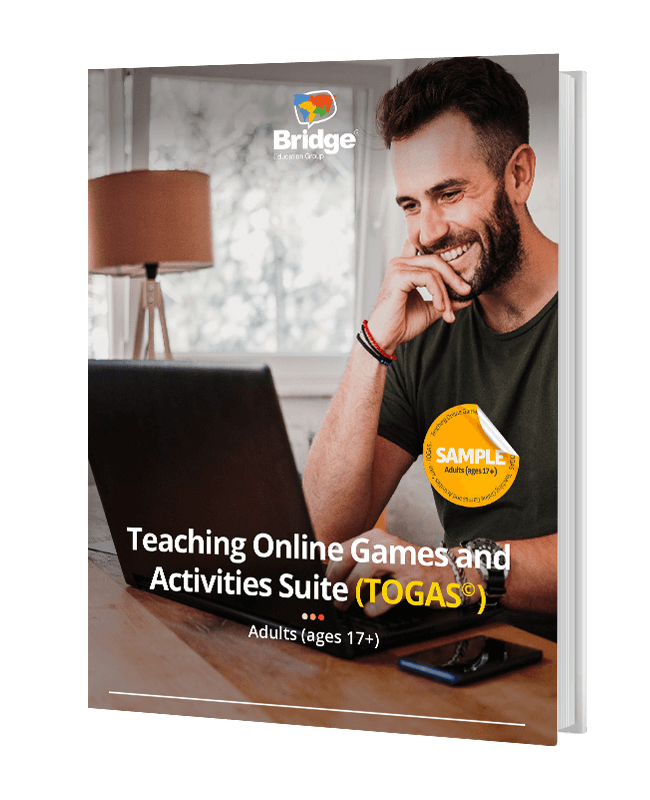Have you ever heard the phrase “Games are just for kids” when teaching adults? Here’s some great news: You can and should use ESL games for adults! Let’s take a closer look at why using games is effective and explore some appropriate games to incorporate into your adult or Business English lesson plans!
If you’re new to teaching, you’ll want to get initial training and qualification with a TEFL certificate. You can explore our online TEFL courses to get started!
Why use ESL games for adults?
Since our ability to learn is connected to our state of mind, we learn best when we’re in a positive mental state. Games can open a student’s mind to positive learning moments, also known as “best learning moments.” This positive mental state can be reached when students experience curiosity, interest, engagement, or happiness paired with optimism, confidence, and calmness. Feelings of enjoyment help students retain their newly acquired knowledge long term.
When teaching English online to adults, technology-enhanced learning (TEL) is a great and easy way to create these best learning moments. Use smartphones for vocabulary games, virtual crosswords, or other activities, or provide access to language tutoring apps that give students opportunities to practice speaking during free time in a low-stakes environment. Using technology in the classroom is easy and requires little preparation!
-
Pro Tip: If you have a student resistant to engaging in games, then don’t call them games – call them activities, procedures, or tasks. The only difference is the wording, but if this helps your student to keep an open mind about the activity, then adjust your terminology.
Read about ESL pronunciation games for kids, teens, and adults.

15 simple ESL games for adults
When designing fun ESL activities for adults, always make sure that the games you choose are appropriate and relevant for your students’ age, language level, and specific needs (if they are studying English for a certain profession, for example).
Here are 15 fun ESL games for adults, whether you teach in a physical classroom or online. All of them require little to no materials, little preparation time, and no expenses (except if you buy the Scrabble board game version).
Get additional tips for creating materials for the EFL classroom.
1. Crosswords/Virtual Crosswords
Crosswords are excellent for when you’re teaching vocabulary around a certain topic, profession, or business situation. You can also use them when you’re pre-teaching vocabulary for a later task or assignment.
You can design your own crossword puzzles using definitions from the dictionary, or you can use software that helps you create them. If you’re teaching a group of high-level students, you can also let them design crossword puzzles for each other.
-
Pro Tip: This would make an excellent asynchronous task when you’re teaching online. During the synchronous lesson time, your students can then solve the crosswords. You can also set time limits or let your students compete against each other if you feel they’re up for it.
2. The Right Word
In this challenging game, your students have to find which words correspond to the given definitions. This isn’t as simple as it sounds because even if the definition reminds them of a familiar word, they may not know the word on your game sheet. This is excellent practice for extending your students’ range of vocabulary and their fluency. You can also give your students clues, depending on their level.
For business professionals, expressing themselves fluently and accurately is an important ability they’ll have to use every day, and this game helps them do just that.
Teaching adults learning English for their profession? Raise your level of professionalism and better prepare your students with a Specialized Certification in Teaching Business English.
3. Embroidery
In this language game, you’ll prepare ahead of time sets of boxes or envelopes that each contain a letter of the alphabet. Your students must find the word hidden within the scramble of letters. You can choose the length and difficulty of the words, as well as the topic or group of words they belong to. For lower-level students, you can also provide some clues to help them find the correct answer.
The skills your students can gain during this exercise are very useful in business situations, as the game trains them to scan through names, flight information, or other paperwork to find the important details.
-
Pro Tip: If you’re teaching online, you can use presentation software to let the letters pop up one by one with sound effects to give this activity a game show feel.

4. Seize the Keywords
In this exercise, you’ll create and give your students a 10-line story, and they have to memorize the order in which all of the verbs appear. Then, you collect the stories and give them a worksheet where all of the verbs are listed at random. Your students then have to place them in the correct order, as they found them in the text. If your students are attentive enough and understand the story, it’s easy for them to remember the logical order of the verbs (as verbs imply action).
This is an excellent game to use to teach verbs, verb groups, and tenses since you, as the author of the story, can use all of the words and tenses you wish to teach during that lesson. If you ask your students to retell the story at the end of the lesson, they can also gain valuable public speaking and memorization skills for presentations and speeches.
-
Pro Tip: You can extend speaking practice beyond the classroom with language apps. Recommending or providing access to speaking practice apps like FLOW Speak gives students opportunities to practice conversing in English outside of class. FLOW Speak has over 400 real-world conversation lessons, each a short 2-7 minutes, which students can complete privately on their own time. After analyzing the student’s voice, it provides instant AI-powered feedback so students can practice over and over to master sounding natural and confident. An admin dashboard also allows teachers to track students’ progress, which can be used to inform teaching strategies in the classroom.
5. The Story Is Full of Blanks
Let your students be editors by going through a text in which words are missing. They must then choose the correct word out of a list of words provided. To make it more creative and interesting, you can let your students choose between articles, prose, drama, or poetry. You can copy any appropriate text passage that will benefit your students’ needs, level, and purpose of studying English.
This game provides your students with the skill of identifying the best word in a certain context, which helps with writing emails, reports, letters, or handouts.
You can also learn even more about ESL games for adults in the Games and Activities for the Online Classroom (Adults) Micro-credential.

6. Scrabble
This classic board game is a good activity for reviewing the vocabulary your students already know, and there are many free versions online. Students can use the Scrabble letters to build words according to their language proficiency, and they will most likely try to impress you by remembering specific terms you’ve taught them!
Scrabble is a good game for lower- to intermediate-level students since advanced students often aim to learn new words and expressions during an English lesson instead of reproducing what they already know.
7. Scattergories
Another classic game, this can be simplified from the original version with twelve categories with a single word all beginning with a predefined letter to three categories. For example, you choose the letter “t” and provide students with the categories of “Wild Animals,” “Hobbies,” and Adjectives.” Give students a set amount of time and they write as many words starting with “t” in each of those categories as they can. For wild animals, they might write “tiger” and “toucan,” for hobbies, they might write “travel” and “tennis,” and for adjectives, they might write “talented” or “teachable.”
This is a great game to build intercultural competence with your adult students who may come from many different backgrounds. Students will find very different answers across categories like “Wild Animals” or other categories you may come up with.
-
Pro Tip: For beginning students, you can simplify this even more with just one word in each category or one category in which students try to think of multiple words.
8. Roleplaying
When it comes to ESL speaking activities for adults, roleplaying games are very important to practice fluency, correct use of vocabulary and grammar, and listening skills all at the same time. Roleplaying is also a great opportunity to teach English for specific purposes since you and your students can create a situation that resembles their professional lives.
Roleplaying can also prepare students for upcoming job interviews. It allows your students ample speaking time, while you observe, take notes, and pay attention to important errors that need reviewing and correcting at the end of the activity.
-
Pro Tip: If you’re teaching online, you can simulate an online business conference with video conference software like Zoom, or you can even ask all of your students to turn off their cameras and only focus on what they hear to practice making phone calls. If you’re teaching asynchronous lessons, you can exchange pretend work emails with your students or practice follow-up emails after a fictitious job interview.
9. Charades
If you’re teaching adults who are learning English to apply for job promotions or to prepare for job transfers overseas, you’ll likely spend a lot of time together, as these types of preparatory courses are often very comprehensive. In these situations, students will often open up to and trust you in a way that’s not always possible during other ESL classes, where your students are often changing.
In group classes, a game of charades can be very relaxing and freeing for your students; they can let go of the pressure and have some fun together while still progressing in their English abilities. However, since charades can get quite silly and require a certain confidence in front of a group, this game is not very suitable for a small group of, let’s say, CEOs and managers who need to show authority towards others.
-
Pro Tip: Charades can be played in the online classroom if you and your students are equipped with enough space and a good place to set up webcams.

10. Articulate
Similar to Charades, students are working against the clock in this game to identify a hidden word, but rather than acting out the word or idea, the student will articulate words that describe for their team the hidden word. For example, if the hidden word is “breakfast,” students may say things like “eating” and “morning” or certain foods like “cereal” or “eggs.” Play in teams with points awarded for each time a team correctly guesses the word.
Depending on the language levels of your students, you can limit the number of words your players use to describe the hidden word to a single word or 2-3 word phrases. Great for building vocabulary and teaching your adult students to think on their feet, this is a fun game that can easily be played in person or online.
11. Taboo
If your students like games like Charades and Articulate, they’ll like the additional challenges added by Taboo. Like the other two games, you’ll come up with a word students will need to guess. You’ll identify a student and show them the word, and they’ll come up with words or phrases to describe the hidden word to provide clues to their teammates so they can guess the hidden word.
The twist with Taboo is you’ll give your student taboo words they can’t use in their descriptions to their teammates. With these limitations, students are made to think of synonyms, providing great practice in this skill. For example, if your hidden word is “winter,” taboo words could include “cold” or “season.” Taboo can also be easily played in the online classroom by simply having students type in their guesses. If you have a fun, comfortable class environment, feel free to bring in a buzzer to buzz students who say a taboo word!
12. First Letter, Last Letter
In this game, have your students sit in a circle if you teach in a physical classroom. If you’re teaching online, you need to decide the order of who goes after whom before you start the game.
The first person writes or says a word and the next person has to come up with another word using the last letter or the last few letters of that word. This is a verbal game that doesn’t require any materials or preparation, which makes it a great activity if you need a spontaneous lesson plan.
For example, the first student says “promotion.” The next student takes the last letter “n” and might say “negotiation,” and so on. To make it more difficult, you can also have students use the last two letters, or the last three letters even. This challenges your students to come up with longer words too.
In the two-letter case, “promotion” may become “online,” while in the three-letter case, “promotion” may become “ionization,” which is a very difficult word relevant probably only to professional chemists. Alternatively, you can teach your students what syllables are and let them use the last syllable of the previous word.
-
Pro Tip: If you’re teaching online, this could be a fun asynchronous game to keep up throughout the day, using smartphones and messaging apps. You and your students can toss around words during a certain time of the day, which also motivates them to look up new words, browse their dictionaries, and read articles to find new words.
Need more ESL game ideas teaching adults online? Download the free sample eBook, Teaching Online Games and Activities (TOGAS) – Adults.
Build your students' confidence with this free eBook sample
Teaching Online Games and Activities – Adults
download13. Countdown
In this timed activity, students are given nine randomly generated letters that mix consonants and vowels and must create as many words as they can from those letters. You can use an online random letter generator like Picker Wheel to give the game a game show feel. Just be sure to mix in at least two vowels.
Students then compete to make as many words as they can from the assortment of letters. You can make this more difficult by making it a rule that all letters must be used or less difficult by letting students use any combination of letters for words of any length. Set a timer and students must make their words as fast as they can before time runs out!
14. 20 Questions
Playing 20 Questions with business-related topics can be a great way to practice speaking skills, especially when teaching interrogative forms. One student draws a card with a word on it. This can be a person, a thing, an event, or a situation. You can choose the rules with your students ahead of the lesson, and you can prepare accordingly. Then, the other students have 20 chances to ask questions and find out what word is written on the card. The first student can only answer “yes” or “no.”
For example, the rule is that it can be a thing or a person related to professions. The student chooses the word “lawyer.” The flow of questions could be:
-
“Is it a person?” “Yes.”
-
“Does that person work outside?” “No.”
-
“Does that person work inside a special building?” “Yes.”
And so on.
You can prepare cards with words ahead of class or let students choose their own words, and if you’re teaching online, you can send the students words via texting or online messaging.
15. Never Have I Ever
A fun icebreaker activity, this game gets students talking and getting to know one another. Best of all, no preparation is required. Simply play when ready.
To start, have students all raise a hand with all five fingers up. One student will begin by sharing something they’ve never done. The goal is to think of something they think their classmates have done. For example, a student might say, “I have never traveled on an airplane.” Any student who has traveled on an airplane puts a finger down. Another student goes next, stating something they have never done, and again, any students who have done it put another finger down. And so on.
The last student holding up at least one finger wins. This is a fun way to get to know one another and provides great opportunities for you to correct common sentence mistakes. For example: “I have never been on Disneyland” vs. “I have never been to Disneyland.”
ESL games for adults train your students to recognize, remember, and understand words, and they facilitate fluency, grammatical skills, and vocabulary. By engaging completely in a game, feeling positive emotions while playing it, and experiencing best learning moments, your students will enjoy your lessons and come back for more!














